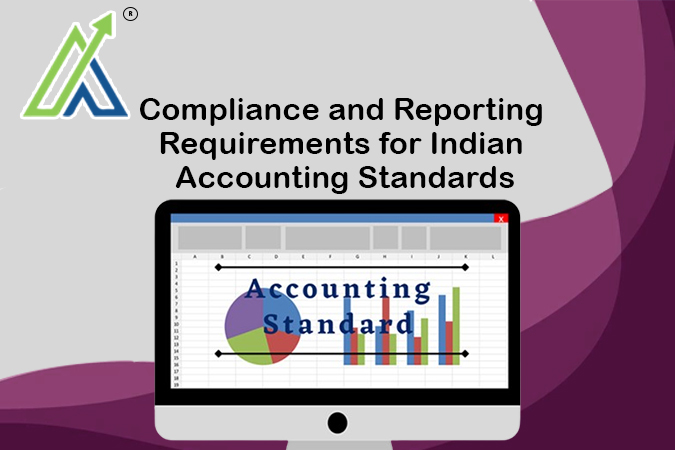The financial world moves quickly these days, so it’s important that financial reports are clear and consistent. The Indian Accounting Standards (Ind AS) are made by the Ministry of Corporate Affairs (MCA) and the Institute of Chartered Accountants of India (ICAI). The goal of these guidelines is to make Indian financial reporting more like what is done around the world, so everything is clear and the same. Let’s make the rules for following these standards and reporting them easy to understand and fun to read.
What are Indian Accounting Standards (Ind AS)?
Indian Accounting Standards (Ind AS) are rules set by the MCA to ensure financial statements are clear and consistent. They are pretty similar to the International Financial Reporting Standards (IFRS). Whether a company needs to follow these rules depends on its net worth and if it’s listed on the stock exchange.
Who Needs to Follow These Standards?
Mandatory Compliance: If a company has a net worth more or equal to Rs.250 crores than it needs to follow Ind AS.This applies to separate financial statements as well as consolidated financial statements.
Voluntary Compliance: If any company’s net worth is below than Rs.250 crores than it is eligible for Ind AS.It’s up to the company whether to align with global practices or not.
What Financial Statements Are Required?
According to Ind AS, companies need to make balance sheets, profit and loss statements, cash flow statements, and notes. For things to be clear and consistent, these financial records need to be put together in a certain way.
Consolidated Financial Statements
For companies with subsidiaries, Ind AS 110 requires consolidated financial statements. This gives a clear picture of the financial health of the whole group, not just the parent company.
Segment Reporting
Ind AS 108 makes companies report financial info for different segments of their business. This helps stakeholders see how each part of the company is performing.
Related Party Disclosures
To maintain transparency, Ind AS 24 mandates companies reveal their finances and transactions with linked parties.
Reporting Rules
Audit Requirements
Financial statements under Ind AS must be audited by a Chartered Accountant. The audit checks if the statements show the true financial status and comply with the Companies Act, 2013, and other laws.
Board of Directors’ Report
A report outlining the financial situation, performance, compliance to accounting rules, and other important disclosures must be given by the board of directors.
Filing with Authorities
Companies must file their financial statements and other documents with the Registrar of Companies (ROC) annually. Listed companies must also file their financial results with stock exchanges. Not filing can lead to penalties and other actions.
Interim Reporting
For periods shorter than a complete fiscal year, such as quarterly reports, listed firms are required by Ind AS 34 to publish interim financial reports.
Disclosures and Notes
In compliance with Ind AS, every relevant detail, including estimates, judgments, and accounting policies, must be fully reported in the financial statements.
Challenges and Tips for Compliance
Transition and Training
Making the switch to Ind AS can be challenging, particularly for newbies. Good accounting software and systems, together with appropriate training, are vital.
Ongoing Monitoring
Compliance with Ind AS isn’t a one-time task. It needs continuous monitoring and updating of practices. Strong internal controls and governance are key.
Expert Assistance
Hiring consultants and auditors who know Ind AS can help navigate complexities and ensure accurate reporting.
Questions to Understand your ability
Ques1: Who sets the rules for Indian Accounting Standards (Ind AS)?
- Reserve Bank of India (RBI)
- Ministry of Corporate Affairs (MCA)
- Securities and Exchange Board of India (SEBI)
- National Stock Exchange (NSE)
Ques2: Which companies must follow Ind AS?
- Companies with net worth over INR 100 crore
- Companies with net worth over INR 500 crore
- Companies with net worth over INR 250 crore
- Companies with net worth over INR 50 crore
Ques3: What does Ind AS 110 focus on?
- Segment Reporting
- Consolidated Financial Statements
- Related Party Disclosures
- Interim Financial Reporting
Ques4: What must companies disclose under Ind AS 24?
- Interim Financial Reports
- Balance Sheets
- Related Party Transactions
- Segment Reports
Ques5: Who audits the financial statements under Ind AS?
- Company Secretary
- Chartered Accountant
- Financial Analyst
- Internal Auditor
Conclusion
Accounting standards in India are crucial for transparency, consistency, and reliability in financial reporting. MCA and ICAI have laid strict rules that every company must adhere to for the purpose of proving its proper financial position and performance. Grasping and implementing them increases stakeholder trust and conforms to international best practices in financial reporting.
Compliances and reporting requirements, if followed minutely, would ensure that the companies project a proper and correct view of their respective financial health in front of stakeholders, who could then show trust and have confidence in such companies.
FAQ’s
Rules for financial reporting set by the MCA.
companies with net worth of INR 250 crore or more must comply. Others can opt in.
It shows how different parts of a company are doing.
To keep things transparent.
To keep things transparent.
They comply to the law and verify that financial statements are accurate.
They could face penalties and legal trouble.
Every year with the Registrar of Companies (ROC) and for listed companies, also with stock exchanges.
Reporting financials for shorter periods like quarterly.

